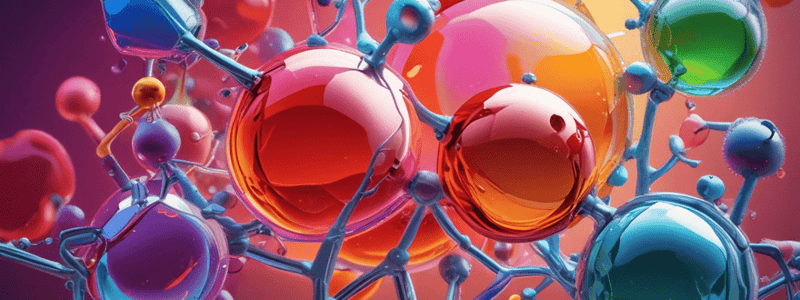Podcast
Questions and Answers
Which of the following is NOT a common example of a haloalkane?
Which of the following is NOT a common example of a haloalkane?
- Ethyl alcohol (C2H5OH) (correct)
- Trichloroethane (CCl3CHCl2)
- Chloroform (CHCl3)
- Dichloromethane (CH2Cl2)
Which property of haloalkanes makes them useful as fuels, refrigerants, and solvents?
Which property of haloalkanes makes them useful as fuels, refrigerants, and solvents?
- Low polarity and low solubility
- High reactivity and low stability
- High volatility and low energy density
- Low volatility and high energy density (correct)
What unique electronic property do haloarenes exhibit that makes them valuable in diverse applications?
What unique electronic property do haloarenes exhibit that makes them valuable in diverse applications?
- Low polarizability and high reactivity
- Low electron density and high electronegativity (correct)
- High polarizability and low reactivity
- High electron density and low electronegativity
Which of the following is NOT a common use of alcohols?
Which of the following is NOT a common use of alcohols?
Which of the following compounds is an example of a phenol?
Which of the following compounds is an example of a phenol?
Which of the following is NOT a common characteristic of ethers?
Which of the following is NOT a common characteristic of ethers?
What is the primary difference between alcohols and phenols?
What is the primary difference between alcohols and phenols?
Which of the following is a correct statement about phenols?
Which of the following is a correct statement about phenols?
Which of the following is NOT a common type of ether?
Which of the following is NOT a common type of ether?
Which of the following is an example of an aryl ether?
Which of the following is an example of an aryl ether?
Which of the following functional groups is NOT present in salicylic acid (p-hydroxybenzoic acid, C6H4(OH)(COOH))?
Which of the following functional groups is NOT present in salicylic acid (p-hydroxybenzoic acid, C6H4(OH)(COOH))?
Which of the following statements about ethers is correct?
Which of the following statements about ethers is correct?
Which of the following is an example of a cyclic ether mentioned in the text?
Which of the following is an example of a cyclic ether mentioned in the text?
Which of the following compounds is a halogenated compound?
Which of the following compounds is a halogenated compound?
Which functional group can act as both an acid and a base depending on pH conditions?
Which functional group can act as both an acid and a base depending on pH conditions?
In cellular respiration, which class of compounds plays a significant role?
In cellular respiration, which class of compounds plays a significant role?
Which of the following reactions are amines NOT commonly involved in?
Which of the following reactions are amines NOT commonly involved in?
Which type of compound contains a nitrogen atom bonded to a hydrogen atom and two distinct substituents?
Which type of compound contains a nitrogen atom bonded to a hydrogen atom and two distinct substituents?
Which nitrogen-containing compound is formed by combining an amino group with an acid chloride or an ester?
Which nitrogen-containing compound is formed by combining an amino group with an acid chloride or an ester?
Which class of organic compounds contains a carbonyl group bonded directly to a hydroxy group?
Which class of organic compounds contains a carbonyl group bonded directly to a hydroxy group?
Which of the following statements about aldehydes is correct?
Which of the following statements about aldehydes is correct?
Which of the following is a common example of a ketone?
Which of the following is a common example of a ketone?
What is the primary difference between aldehydes and ketones?
What is the primary difference between aldehydes and ketones?
Which of the following reactions do both aldehydes and ketones undergo?
Which of the following reactions do both aldehydes and ketones undergo?
Which of the following statements about carboxylic acids is incorrect?
Which of the following statements about carboxylic acids is incorrect?
Which of the following is an example of a nitrogen-based compound?
Which of the following is an example of a nitrogen-based compound?
What is the unique property of nitrogen-based compounds that makes them important in various applications?
What is the unique property of nitrogen-based compounds that makes them important in various applications?
Which of the following reactions can occur between carboxylic acids and alcohols?
Which of the following reactions can occur between carboxylic acids and alcohols?
Which of the following functional groups is present in both aldehydes and ketones?
Which of the following functional groups is present in both aldehydes and ketones?
What is the general formula for carboxylic acids?
What is the general formula for carboxylic acids?
Flashcards are hidden until you start studying
Study Notes
Introduction
Organic chemistry is the branch of chemistry that deals with the synthesis and properties of organic compounds. This field covers a wide range of subtopics, including halogenated compounds, alcohols, phenols, and ethers. In this article, we will explore these subtopics: hydrohaloalkanes, haloarenes, alcohols, phenols, and ethers. These compounds play crucial roles in various industries such as pharmaceuticals, agriculture, and materials science.
Haloalkanes
Haloalkanes are organic compounds containing halogen atoms bonded to a carbon atom. They are widely used as fuels, refrigerants, and solvents due to their relatively low volatility and high energy density. Common examples include chloroform (CHCl3), dichloromethane (CH2Cl2), and trichloroethane (CCl3CHCl2).
Haloarenes
Haloarenes are aromatic hydrocarbons with attached halogen atoms. They exhibit unique electronic properties, making them valuable in diverse applications such as electronics, catalysis, and energy storage. Examples include halobenzenes and halopyrenes, which contain single or multiple halogen substituents on the aromatic ring.
Alcohols
Alcohols are organohalogen compounds containing a hydroxyl group (-OH) bonded to a carbon atom. They find extensive uses as solvents, denaturants, and intermediates in organic synthesis. Examples include methanol (CH3OH), ethanol (C2H5OH), and higher aliphatic alcohols (CnH2n+1OH).
Phenols
Phenols are aromatic alcohols containing a hydroxyl group (-OH) bonded to an aromatic ring. They have diverse applications in pharmaceuticals, agrochemicals, and polymers. Common examples include phenol itself (C6H5OH), salicylic acid (p-hydroxybenzoic acid, C6H4(OH)(COOH)), and anisole (p-methoxy-phenol, C6H5OCH3).
Ethers
Ethers are organic compounds consisting of two alkyl or aryl groups bonded to an oxygen atom. They serve as solvents, fuel components, and building blocks in organic synthesis. Common ether types include alkyl ethers (CnH2n+1O), aryl ethers (C6H5OCH2R), and cyclic ethers like tetrahydrofurans (THF).
In conclusion, organic chemistry encompasses a variety of subtopics, including halogenated compounds, alcohols, phenols, and ethers. These subtopics play vital roles in numerous industries and applications, highlighting the importance of understanding their synthesis, structure, and reactivity.
Studying That Suits You
Use AI to generate personalized quizzes and flashcards to suit your learning preferences.





